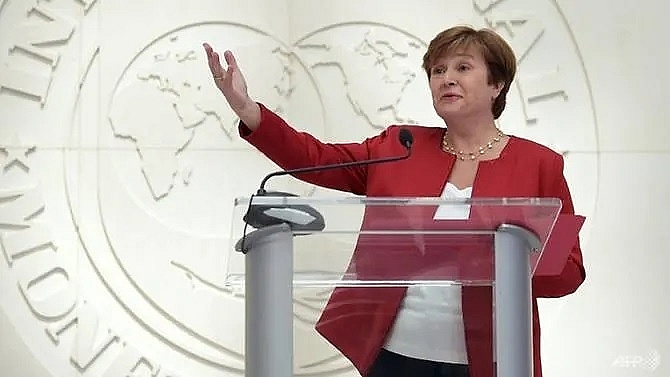Kristalina Georgieva named IMF managing director
 |
| Kristalina Georgieva survived a challenge within the European Union from Germany, which backed a Dutch former finance minister. (AFP/Eric BARADAT) |
The selection had been all but guaranteed after the global crisis lender said earlier this month that Georgieva, a former World Bank CEO, was the sole candidate.
In acknowledging her selection, Georgieva spoke of tempestuous times for the global economy.
"It is a huge responsibility to be at the helm of the IMF at a time when global economic growth continues to disappoint, trade tensions persist, and debt is at historically high levels," she told reporters.
"This means also dealing with issues like inequalities, climate risks and rapid technological change."
Georgieva is to take up her position as managing director on Oct 1, replacing Christine Lagarde, who is expected to take over the European Central Bank later this year.
She inherits the helm of an institution buffeted by the rise of populism in advanced economies and escalating trade conflicts - the largest of which has been driven by the United States, the fund's single biggest shareholder.
Her rise perpetuates Europe's long-standing control over the designation of the fund's leadership.
Georgieva, who was championed by Paris, overcame a challenge within the divided European Union from Germany, which had backed former Dutch finance minister Jeroen Dijsselbloem.
French Finance Minister Bruno Le Maire tweeted his congratulations on Wednesday, saying the IMF will "thanks to your experience be able to fulfill its role in the world economy."
CLEAR PATH
In a sign that Georgieva was indeed a shoo-in for the position, the fund this month formally lifted its age limit of 65 years for the leadership position, removing an obstacle that would have barred the 66-year-old.
Under an unwritten rule, a European has led the IMF since its creation in the aftermath of World War II while the leader of the fund's sister organisation, the World Bank, has been designated by Washington.
David Malpass, a former US Treasury official who took office earlier this year as president of the World Bank, likewise faced no opposition.
An economist by training, Georgieva was previously Bulgaria's EU commissioner from 2010 and served as the commission's vice president for budget and human resources from 2014 to 2016.
In 2016, she was a leading candidate to become UN secretary-general before losing out to former Portuguese premier Antonio Guterres.
Jubilee USA, a faith-based debt-relief organization, hailed Georgieva's selection.
"Under Georgieva's leadership, we will see emphasis on gender inequality, environmental issues and the need for more resources to be directed to the developing world," Eric LeCompte, Jubilee USA's executive director, said in a statement.
What the stars mean:
★ Poor ★ ★ Promising ★★★ Good ★★★★ Very good ★★★★★ Exceptional
Related Contents
Latest News
More News
- Ho Chi Minh City launches plan for innovation and digital transformation (February 25, 2026 | 09:00)
- Vietnam sets ambitious dairy growth targets (February 24, 2026 | 18:00)
- Masan Consumer names new deputy CEO to drive foods and beverages growth (February 23, 2026 | 20:52)
- Myriad risks ahead, but ones Vietnam can confront (February 20, 2026 | 15:02)
- Vietnam making the leap into AI and semiconductors (February 20, 2026 | 09:37)
- Funding must be activated for semiconductor success (February 20, 2026 | 09:20)
- Resilience as new benchmark for smarter infrastructure (February 19, 2026 | 20:35)
- A golden time to shine within ASEAN (February 19, 2026 | 20:22)
- Vietnam’s pivotal year for advancing sustainability (February 19, 2026 | 08:44)
- Strengthening the core role of industry and trade (February 19, 2026 | 08:35)

 Tag:
Tag:




















 Mobile Version
Mobile Version